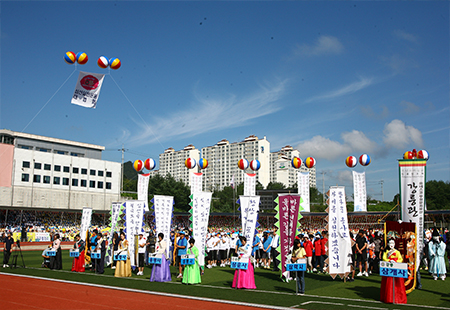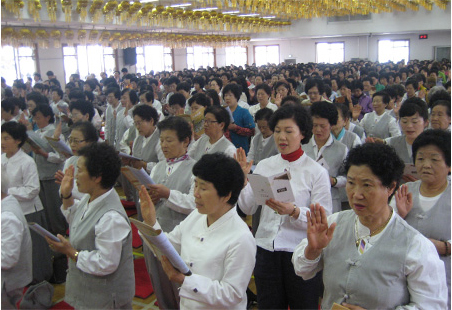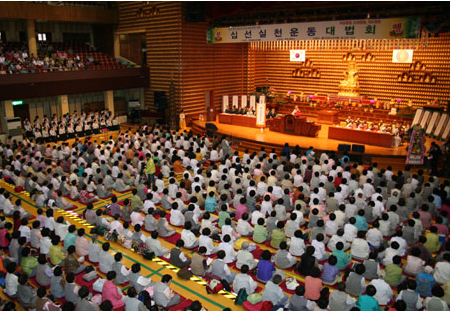Daegwangsa

- Supreme Patriarch Sangwol Wongak preached 10 religious precepts
to the public who participated in winter Vassa and told them to keep them in the future.
These are the very ten virtue commandments (十善戒) that believers of Tiantai Buddhism must basically keep.
On January 16, 1969, Supreme Patriarch Sangwol Wongak preached 10
religious precepts to the public who participated in winter Vassa and told them
to keep them in the future. These are the very ten virtue commandments (十善戒)
that believers of Tiantai Buddhism must basically keep.
The ten virtue commandments are the law that ascetics basically have in
Mahayana Buddhism as the religious precepts that three world Buddhas (All the past,
present, and future Buddhas) commonly preach in all the scriptures. The Tiantai religious
group's ethical standards are very different from those of other religious groups.
These come from the ten virtue commandments.
First, No destruction of life, ahimsa (不殺生). Do not kill all living things.
Second, No robbery(不偸盜). Do not rob others of their property.
Third, No sensual pleasures (不邪婬). Do not commit obscene things.
Fourth, No idle words (不妄語). Do not tell lies or idle words.
Fifth, No swear words (不惡口). Do not tell the bad words that make trouble for others.
Sixth, No mischief-making (不兩舌). Do not play both sides against the middle!
Seventh, No made-up stories (不綺語). Do not tell the words that are not sincere and plot them skillfully.
Eighth, No greed (不貪欲). Do not be greedy.
Ninth, No anger (不瞋恚). Do not get angry.
Tenth, No wrong views (不邪見). Do not have wrong views.
Monks of Tiantai Buddhism get to receive and keep the ten virtue commandments in mind
in spiritual enlightening ceremonies after being Buddhist monks. These ten virtue commandments.
Because these ten virtue commandments seem to be simple but have all the contents about the three
karmas of body or sensation, mouth or speech, and mind or volitional will (身口意), they are the
norms that put hundreds of articles in the existing Buddhist priest and Buddhist nun worlds
together with the spirit of strict religious precepts. It is not easy to observe the ten
virtue commandments because the articles are 10. Even though they are ten articles,
they include all the rules about your thought, words, and behaviors. So you must be
careful in the way you behave and be circumspect in behavior.
-

△ Large Buddhist Lecture Meeting, The Ten Virtue Commandments Practical Movements, Samgwangsa Temple, Busan
-

△ Large Buddhist Lecture Meeting, The Ten Virtue Commandments Practical Movements, Daeseongsa Temple, Daegu
The ten virtue commandments clearly shows the spirit of popular Buddhism of Supreme Patriarch
Sangwol Wongak in that the four classes of the persons who follow Buddha's teachings receive
and keep them mind together without distinction of sex or age and the persons who became
Buddhist monks or the persons who cultivate themselves morally or religiously. They place
a greater emphasis on self-regulating ascetics in that they must realize and be responsible
for the intention, process, and results of their own acts because the detailed parts are not
separately defined.
Supreme Patriarch
Sangwol Wongak taught the fact that the spirit of true religious precepts originates
from internal sincerity to his followers by adopting the ten virtue commandments as the
basic religious precepts. He made them recognize the religious precepts exactly, observe
them strictly, and practice them rather than violating many ones that cannot be observed.
And he realized Popular Buddhism by making all the four classes of the persons who follow
Buddha's teachings have the ten virtue commandments with a sense of ownership.








